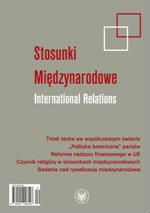CHRL A MISJE POKOJOWE ONZ
The PRC and UN Peacekeeping Missions
Author(s): Jan Rowiński, Piotr SzafraniecSubject(s): Politics / Political Sciences
Published by: Wydawnictwa Uniwersytetu Warszawskiego
Keywords: chrl; prc; onz; chiny; china
Summary/Abstract: The attitude of the People’s Republic of China towards peace-keeping operations has evolved from adamant opposition in the 1970s into active participation at the beginning of the 21st century. In 2008 China contributed more military, police and civil forces to international peacekeeping than any other of the UN’s Security Council member states. This radical change originates from the whole set of reforms which began to be implemented at the end of the 1970s by the new Chinese leadership. Yet no matter what the particular Chinese standpoint on peacekeeping at a given moment was, it always remained in line with the Chinese national interest as defined by the successive governments of China. This political change was actually a slow process of adjustments marked by recurring vacillations and temporary regressions. Thus, it may be divided into several stages: 1) In the 1970s the Chinese policy towards peacekeeping was in fact an undisturbed continuation of the previous stance, with peacekeeping seen as a dangerous instrument wielded by the Soviet and American hegemonies, which used it to subdue the nations of the so-called Third World. 2) The first signs of policy redefinitions were implemented at the beginning of the 1980s. In 1981 Chinese representatives actively supported peacekeeping activities for the first time, voting for the prolongation of the UNFICYP (United Nations Peacekeeping Force in Cyprus). 3) The significant acceleration of the whole process took place after the Tiananmen Massacre, when the Chinese leadership had to fight growing international isolation. This made China passively accept the actions of the United States and its allies in Iraq, even though it raised a formidable challenge to the sacrosanct principles of non-intervention and the resolution of conflicts by peaceful means that were the tenets of Chinese foreign policy at that time. 4) Finally, in the late 1990s the cautious policy of the past was abandoned and international peacekeeping started to be perceived as a convenient tool for promoting China’s own national interest. Selective but unwavering participation in UN peacekeeping operations was to strengthen the whole UN system, yet at the same time did not compromise any of China’s vital interests.
Journal: Stosunki Międzynarodowe
- Issue Year: 37/2008
- Issue No: 1-2
- Page Range: 83-101
- Page Count: 19
- Language: Polish

